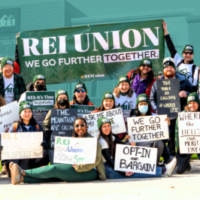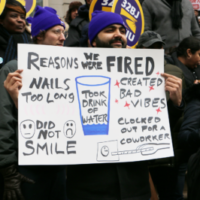
Executive Summary
Amazon, Walmart, Uber, and a host of major economic players in the United States are advancing a regressive federal-level labor deregulation campaign under the auspices of a lobby group called the Coalition for Workforce Innovation (CWI). Under the guise of “innovation and “flexibility,” the CWI threatens to preserve and expand exclusions in the federal labor code, deplete social insurance systems, and cement class, race, and gender inequality in the U.S.
This report provides an overview of the CWI’s origins, goals, membership, strategies, potential worker impacts, and of adjacent labor deregulation efforts. And it sets the CWI’s agenda against worker-led organizing and policy efforts aimed at ensuring employer accountability and more universal access to good quality jobs and the rights that guarantee them.
The first section of the report provides context for the formation of the CWI and outlines the group’s goals. In 2019, as worker-led campaigns across the U.S. were raising labor standards and winning broader access to labor rights, the CWI emerged to strip away those gains and altogether jettison labor rights for a large and disproportionately Black, immigrant, and female swath of the workforce. The CWI is seeking “broad adoption” of “independent work”—work done by “independent contractors” or nonemployees carrying another label, who don’t have access to the full gamut of employment-based rights and protections—“across all positions, platforms, and industries.”
The CWI’s attacks on workers’ rights build on a history of racist carveouts from statutory labor protections that have disproportionately hurt Black workers. The group is a new front in an ongoing effort by big business to reshape U.S. labor law in its own image—to clear the regulatory path for riskshifting, exploitative labor outsourcing practices through modern-era “carveout” policies (summarized in Appendix A) that excise certain workers and employers from labor regulation.
The report’s second section sketches the CWI’s vast membership (with more detail on individual members provided in Appendix B). The CWI unites the nation’s largest retailers, Big Tech,1 digital labor platform companies and temporary help and staffing agencies operating in every major employment sector, trucking and delivery and construction interests, multi-level marketing schemes, finance capital, private insurance providers, operations management consultants, management-side law firms, and other corporate interests.
Among the CWI’s membership are (1) employers in industries that have long abused independent contractor classification; (2) a newer set of employers that straddle the technology sector and various service sectors, use digital platforms to control work, and label workers independent contractors; (3) employers seeking to use more nonemployee labor or protect the use of nonemployee labor in their supply chains; and (4) corporate interests that support or stand to indirectly benefit from the growth of the nonemployee workforce and the total lack of employer responsibility that accompanies it.
Section three of the report presents the interrelated policy, legal, messaging, and organizing strategies the CWI is utilizing to advance its agenda. On the policy front, the CWI and its individual members have been lobbying to restrict worker access to organizing, wage, and other protections at the federal level, and to advance “third way” federal-level carveout policies that lock workers into nonemployee status and substitute long-standing employee rights for a set of substandard rights and benefits. The CWI’s legal strategy is to litigate policies that run counter to its agenda and establish judicial precedent that serves its agenda. Deceptive messaging, central to the CWI’s policy, legal, and organizing work, seeks to make the group’s rights-stripping agenda more palatable to lawmakers and others, and to spin the loss of labor rights and protections as an acceptable tradeoff for “independent work.” Finally, CWI members have been organizing business-to-business to make corporate use of nonemployees more commonplace, and one CWI member is building a corporate-backed organization of “independent workers” to lobby in favor of the CWI’s agenda.
The fourth section of the report describes how the CWI threatens to erode bargaining power and labor standards for millions of underpaid workers in growth sectors of the U.S. economy, cementing income and wealth inequality overall, and along lines of race and gender.
The report’s fifth section describes national and state lobby groups doing work related to the CWI’s agenda. Alongside the CWI, the App-Based Work Alliance, state-level “independent work” coalitions in Colorado, Illinois, Massachusetts, New Jersey, New York, and Washington, as well as the American Legislative Exchange Council, are advancing policies aimed at expanding the “independent worker” and nonemployee workforce.
The sixth and final section of the report lays out a set of pro-worker organizing and policy strategies to build power and defeat the CWI’s anti-worker agenda. Worker and coalitional organizing are fundamental to countering the CWI’s work. And policy reforms must focus on four key areas: improving access to labor rights and employer accountability; expanding worker power and flexibility; protecting the ability of workers to exercise their rights; and creating good public sector and publicly-funded jobs for the future.
Download the full report to read more.




